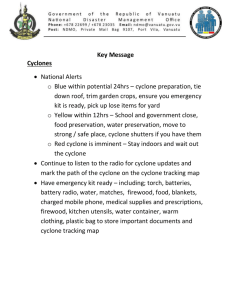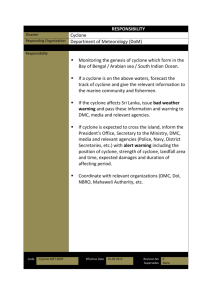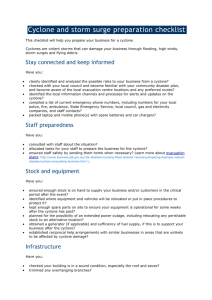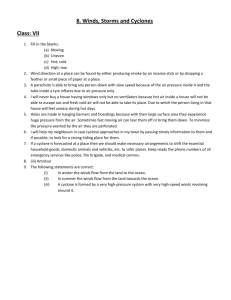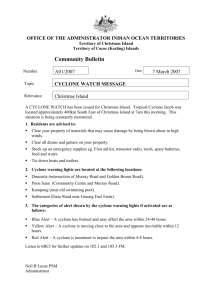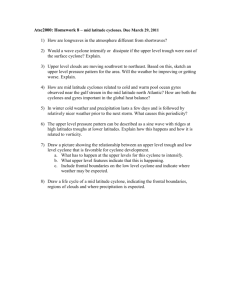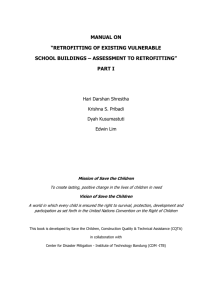Retrofitting / building hospitals safe from disasters
advertisement
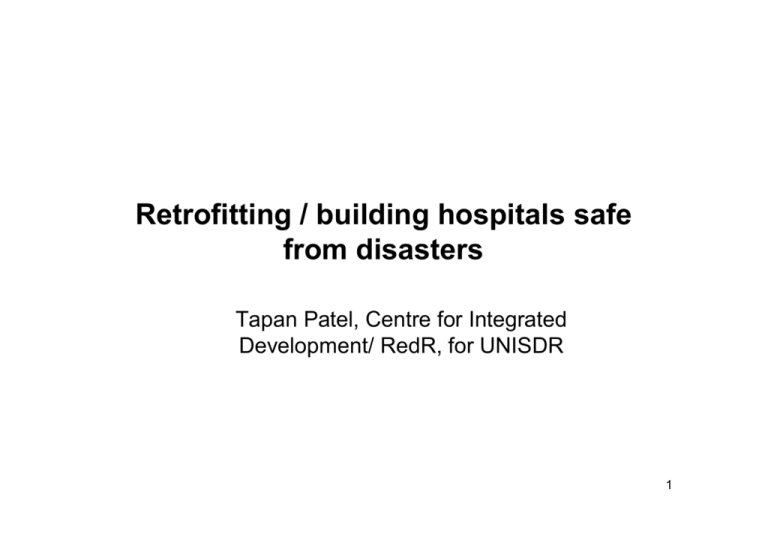
Retrofitting / building hospitals safe from disasters Tapan Patel, Centre for Integrated Development/ RedR, for UNISDR 1 Sources of Information, Photographs and Sketches used in presentation: 1. Seismic Safety of non structural elements and contents in Hospital Buildings- GoI, UNDP 2. A homeowner’s guide to hurricane retrofitting- Institute for business and home safety 3. Improving wind/ cyclone resistance of buildings- Guideline by Prof A S Arya, GoI 4. Manual on Hazard Resistant Construction in India- UNDP, NCPDP 5. Tool kit for Safe Hospitals- UNISDR 6. Field manual on capacity assessment of health facilities responding in emergencies, WHO 7. Training Manual on earthquake, cyclone, flood and tsunami safe construction in Fiji by Mr. Robert Pole and Josefani Bola 8. Various documents of WHO Regional office of South East Asia (SEARO), Pan American Health Organisation (PAHO), FEMA, www.safehospitals.org 2 The most costly hospital is that fails 3 Repair, Restoration, Retrofitting A. Repairs • Actions taken for patching up superficial defects • Include cosmetic works only B. Restoration • Actions taken for restoring the lost strength of structural elements of the C. Retrofitting • Preparing a structure in scientific manner to withstand forces of natural hazards • Up gradation of existing building for increasing the resistance against natural hazards 4 Advantages of retrofitting • Can be done in phased manner. • Elimination of need of temporary structure • Elimination of cost of total demolition of the building 5 Parameters for selection of Techniques for Retrofitting TECHNICAL Building Hazard Site Characteristics Characteristic Characteristic •Foundation •Location •Soil Type •Structure type •Height •Construction Material •Condition LEGISLATIVE Availability of Skilled Human Resource Local and National Building Bye-laws and codes PREFERENCE OF OWNER •Aesthetics •Economics •Accessibility •Time duration •Single Hazard •Multiple Hazard 6 Basics of building functions 7 Basics of building functions 8 Basics of building functions 9 Vulnerabilities to various disasters 10 Most Common Mistakes in Masonry 11 RETROFITTING- EARTHQUAKE 1. Repair of crack and chip-off in walls, RCC elements – Through application or injection of cement slurry grouting – Application of polymer in case of severe crack/chip off before grouting – Application of wire mesh coated with cement grouting 12 RETROFITTING- EARTHQUAKE 2. Rebuilding portions of damaged walls 3. Rebuilding portions of damaged RCC elements 4. Installation of ferro cement plates at the corners of walls to give stability to the building 13 RETROFITTING- EARTHQUAKE 5. Provision of horizontal seismic belts at plinth, lintel and gable level of building 6. Provision of vertical seismic belts at corners of building and around door-windows 7. Restoring RCC slab through cement grouting over wire mesh and coating of polymer etc. 8. Stiffening of wooden floor with galvanized metal strips of 14 additional wooden planks Retrofitting methods Weld Mesh cover Corner reinforcement Bracing at roof Concrete gable band 15 Retrofitting methods Sealing with Cement Mortar Grouting with plasticiser Stitching with strap 16 Flood effects Uneven Settlement Scouring 17 Retrofitting- floods 1. Elevation • Elevation of the existing structure on fill or foundation elements like solid perimeter walls, piers, posts, columns etc 2 Relocation • Relocating existing structure outside the flood plain 3. Dry Flood Proofing • Strengthening of existing foundation, floors and walls • Sealing the portion of structure below flood level. • Use of sealants, wall coating, water proofing for sealing components • Door-window, sewer and water lines and vents closed with permanent or removable vales 18 New construction for floods 19 Retrofitting- floods 4. Wet Flood Proofing • Making utilities, Structural Components and content flood and water resistant during the period of flood within the structure • Modifying structure to allow flood water to enter in a way to minimize damage • Feasible only if structure has space available, basement etc 20 Retrofitting- floods Measures for protection against Flood damage • Proper drainage system around the building, slope adjustment etc • Raising the plinth level to HFL • Grounded edge near the building to protect against scouring by pitching, vegetation etc • Flood Wall/Levee Measures for protection against rain damage • Water Proof Plastering on Leaky Roofs • Proper drainage of roof through adequate slope adjustment • Plastering the top of parapet wall to avoid water absorption in walls • Damp proof layer on wall upto minimum 450 mm or till high flood level 21 Parameters for design safety in cyclone prone areas • • • • • • Site selection Plan form / orientation Roof Structure Openings Glass panels Foundation 22 Retrofitting for cyclone safety 23 Cyclone effects 24 Retrofitting measures at glance 25 26 Retrofitting - Cyclone • Improving connection of wall to roof • Wind bracing through diagonal strap with metal/RCC on walls and roof to prevent pushing against wind • Installation of load wall/parapet on roof hold the roof firmly • Provision of vertical bands at corners of building and doorwindow openings to provide them tensile strength against vertical bending • Additional anchorage of door-window frames with holdfasts • Connecting metal sheets to roof through ‘J’ or ‘U’ bolts • Connecting tiles to rafter through GI hooks 27 Retrofitting - Cyclone 28 Retrofitting - Cyclone 29 Retrofitting - Cyclone 30 Retrofitting - Cyclone 31 Retrofitting - Cyclone 32 Retrofitting - Cyclone 33 Retrofitting - Cyclone 34 Retrofitting - Cyclone 35 Retrofitting - Cyclone 36 THANK YOU 37


